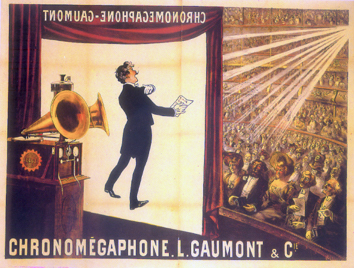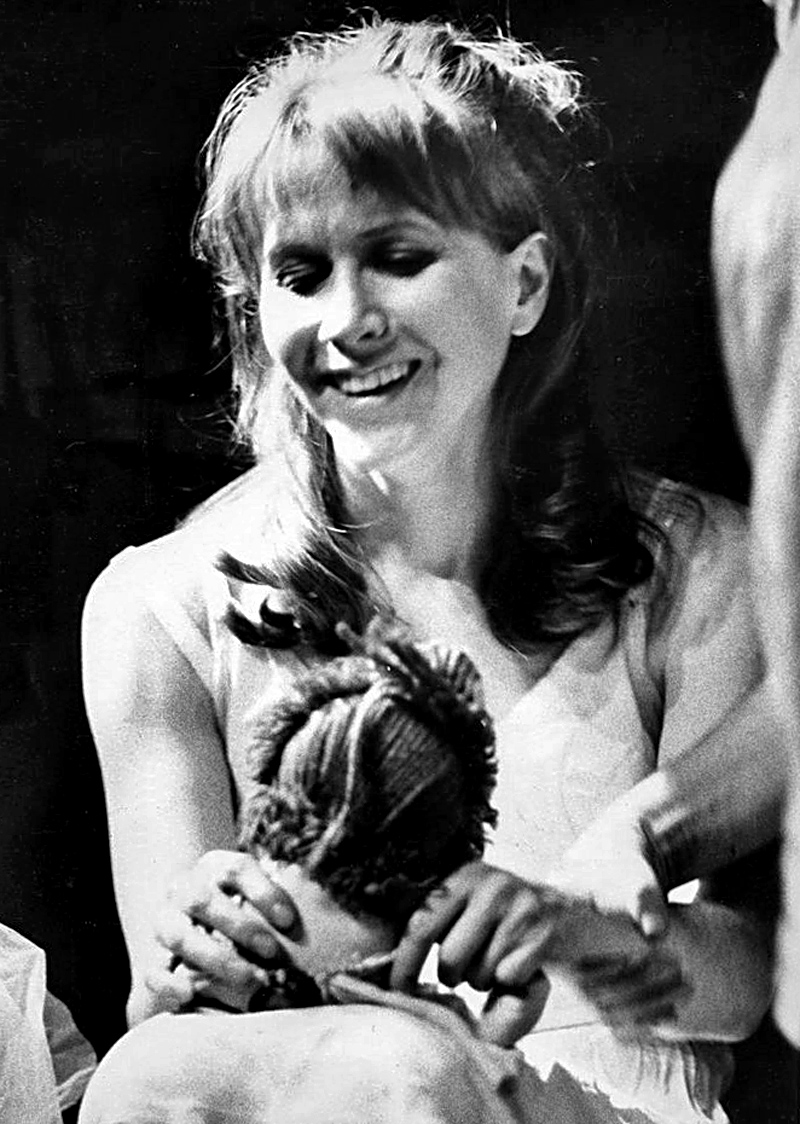|
Gypsy (1962 Film)
''Gypsy'' is a 1962 American musical comedy-drama film produced and directed by Mervyn LeRoy. The screenplay by Leonard Spigelgass is based on the book of the 1959 stage musical '' Gypsy: A Musical Fable'' by Arthur Laurents, which was adapted from the 1957 autobiography '' Gypsy: A Memoir'' by Gypsy Rose Lee. Stephen Sondheim wrote the lyrics for songs composed by Jule Styne. The film was remade for television in 1993. Plot Determined to make her beautiful, gifted daughter June a vaudeville headliner, willful, resourceful and domineering stage mother Rose Hovick will stop at nothing to achieve her goal. She drags June and her shy, awkward, and decidedly less-talented older sister Louise around the country in an effort to get them noticed, and with the help of agent Herbie Sommers, finally manages to secure a booking on the prestigious Orpheum Circuit. Years pass, and the girls no longer are young enough to pull off the childlike personae their mother insists they continue p ... [...More Info...] [...Related Items...] OR: [Wikipedia] [Google] [Baidu] |
Mervyn LeRoy
Mervyn LeRoy (; October 15, 1900 – September 13, 1987) was an American film director and producer. In his youth he played juvenile roles in vaudeville and silent film comedies. During the 1930s, LeRoy was one of the two great practitioners of economical and effective film directing at Warner Brothers studios, the other his cohort Michael Curtiz. LeRoy's most acclaimed films of his tenure at Warners include '' Little Caesar'' (1931), ''I Am a Fugitive From a Chain Gang'' (1932), ''Gold Diggers of 1933'' (1933) and ''They Won't Forget'' (1937). LeRoy left Warners and moved to Metro-Goldwyn-Mayer studios in 1939 to serve as both director and producer. Perhaps his most notable achievement as a producer is the 1939 classic '' The Wizard of Oz'', of which he was also uncredited as a director. Early life LeRoy was born on October 15, 1900, in San Francisco, California, the only child of Jewish parents Edna (née Armer) and Harry LeRoy, a well-to-do department store owner. Both hi ... [...More Info...] [...Related Items...] OR: [Wikipedia] [Google] [Baidu] |
Musical Film
Musical film is a film genre in which songs by the characters are interwoven into the narrative, sometimes accompanied by dancing. The songs usually advance the plot or develop the film's characters, but in some cases, they serve merely as breaks in the storyline, often as elaborate "production numbers". The musical film was a natural development of the stage musical after the emergence of sound film technology. Typically, the biggest difference between film and stage musicals is the use of lavish background scenery and locations that would be impractical in a theater. Musical films characteristically contain elements reminiscent of theater; performers often treat their song and dance numbers as if a live audience were watching. In a sense, the viewer becomes the diegetic audience, as the performer looks directly into the camera and performs to it. With the advent of sound in the late 1920s, musicals gained popularity with the public and are exemplified by the films of Busby Ber ... [...More Info...] [...Related Items...] OR: [Wikipedia] [Google] [Baidu] |
Burlesque
A burlesque is a literary, dramatic or musical work intended to cause laughter by caricaturing the manner or spirit of serious works, or by ludicrous treatment of their subjects."Burlesque" ''Oxford English Dictionary'', Oxford University Press, accessed 16 February 2011 The word derives from the Italian ', which, in turn, is derived from the Italian ' – a joke, ridicule or mockery. Burlesque overlaps in meaning with caricature, parody and travesty, and, in its theatrical sense, with extravaganza, as presented during the Victorian burlesque, Victorian era. "Burlesque" has been used in English in this literary and theatrical sense since the late 17th century. It has been applied retrospectively to works of Geoffrey Chaucer, Chaucer and William Shakespeare, Shakespeare and to the Graeco-Roman classics.Baldick, Chris [...More Info...] [...Related Items...] OR: [Wikipedia] [Google] [Baidu] |
Wichita, Kansas
Wichita ( ) is the largest city in the U.S. state of Kansas and the county seat of Sedgwick County, Kansas, Sedgwick County. As of the 2020 United States census, 2020 census, the population of the city was 397,532. The Wichita metro area had a population of 647,610 in 2020. It is located in south-central Kansas on the Arkansas River. Wichita began as a trading post on the Chisholm Trail in the 1860s and was incorporated as a city in 1870. It became a destination for Cattle drives in the United States, cattle drives traveling north from Texas to Kansas railroads, earning it the nickname "Cowtown".Miner, Prof. Craig (Wichita State Univ. Dept. of History), ''Wichita: The Magic City'', Wichita Historical Museum Association, Wichita, KS, 1988Howell, Angela and Peg Vines, ''The Insider's Guide to Wichita'', Wichita Eagle & Beacon Publishing, Wichita, KS, 1995 Wyatt Earp served as a police officer in Wichita for around one year before going to Dodge City, Kansas, Dodge City. In the ... [...More Info...] [...Related Items...] OR: [Wikipedia] [Google] [Baidu] |
Sound Film
A sound film is a motion picture with synchronized sound, or sound technologically coupled to image, as opposed to a silent film. The first known public exhibition of projected sound films took place in Paris in 1900, but decades passed before sound motion pictures became commercially practical. Reliable synchronization was difficult to achieve with the early sound-on-disc systems, and amplification and recording quality were also inadequate. Innovations in sound-on-film led to the first commercial screening of short motion pictures using the technology, which took place in 1923. The primary steps in the commercialization of sound cinema were taken in the mid-to-late 1920s. At first, the sound films which included synchronized dialogue, known as "talking pictures", or "talkies", were exclusively shorts. The earliest feature-length movies with recorded sound included only music and effects. The first feature film originally presented as a talkie (although it had only limited so ... [...More Info...] [...Related Items...] OR: [Wikipedia] [Google] [Baidu] |
Persona
A persona (plural personae or personas), depending on the context, is the public image of one's personality, the social role that one adopts, or simply a fictional Character (arts), character. The word derives from Latin, where it originally referred to a theatrical mask. On the social web, users develop virtual personas as online identity, online identities. Etymology The Latin word probably derived from the Etruscan language, Etruscan word "", with the same meaning, and that from the Greek ('). Its meaning in the latter Roman period changed to indicate a "character" of a theatrical performance or court of law, when it became apparent that different individuals could assume the same role and that legal attributes such as rights, powers, and duties followed the role. The same individuals as actors could play different roles, each with its own legal attributes, sometimes even in the same court appearance. According to other sources, which also admit that the origin of the ter ... [...More Info...] [...Related Items...] OR: [Wikipedia] [Google] [Baidu] |
Orpheum Circuit, Inc
Orpheum is a name often used for theatres or other entertainment venues. It may refer to: Theatres * Orpheum Circuit, a chain of vaudeville and movie theaters Canada *Orpheum (Vancouver), Vancouver, British Columbia, Canada Germany * Orpheum Dresden Malta *Orpheum Theatre (Malta) United States * Orpheum Theater (Flagstaff, Arizona) *Orpheum Theatre (Phoenix, Arizona) * Orpheum Theatre (Los Angeles), California *Orpheum Theatre (San Francisco), California *Orpheum Theatre (Champaign, Illinois) * Orpheum Theater (Galesburg) Illinois *Hotel Mississippi-RKO Orpheum Theater, Davenport, Iowa * Orpheum Theatre (Sioux City, Iowa) *Orpheum Theatre (Wichita, Kansas) *Orpheum Theater (New Orleans) *Orpheum Theatre (Boston), Massachusetts *Orpheum Theatre (New Bedford, Massachusetts) *NorShor Theatre or Orpheum Theatre, Duluth, Minnesota * Orpheum Theatre (Minneapolis), Minnesota *Orpheum Theater (St. Louis), St. Louis, Missouri *Orpheum Theatre (Omaha), Omaha, Nebraska *Orpheum Theatre (M ... [...More Info...] [...Related Items...] OR: [Wikipedia] [Google] [Baidu] |
Rose Thompson Hovick
Rose Evangeline Hovick (née Thompson; August 31, 1890 – January 28, 1954) was the mother of two famous performing daughters: burlesque artist Gypsy Rose Lee and actress and dancer June Havoc. Her career as her daughters' manager is dramatized in the musical ''Gypsy''. Life and career Rose Evangeline Thompson was born in Wahpeton, North Dakota on August 31, 1890, the daughter of Anna (née Egle) and Charles J. Thompson. Her maternal grandparents were German. Rose Thompson married her first husband, Jack Hovick, when she was a teenager. She gave birth to Rose Louise Hovick on January 8, 1911, in Seattle, Washington, and her second daughter, Ellen June Hovick, in Vancouver, British Columbia, on November 8, 1912. Some sources indicate she was born Ellen Evangeline Hovick in 1913, but Havoc herself acknowledged the earlier year not long before she died. She reportedly had numerous birth certificates for both girls that listed them as being either several years older or younger ... [...More Info...] [...Related Items...] OR: [Wikipedia] [Google] [Baidu] |
Vaudeville
Vaudeville (; ) is a theatrical genre of variety entertainment born in France at the end of the 19th century. A vaudeville was originally a comedy without psychological or moral intentions, based on a comical situation: a dramatic composition or light poetry, interspersed with songs or ballets. It became popular in the United States and Canada from the early 1880s until the early 1930s, but the idea of vaudeville's theatre changed radically from its French antecedent. In some ways analogous to music hall from Victorian Britain, a typical North American vaudeville performance was made up of a series of separate, unrelated acts grouped together on a common bill. Types of acts have included popular and classical musicians, singers, dancers, comedians, trained animals, magicians, ventriloquists, strongmen, female and male impersonators, acrobats, clowns, illustrated songs, jugglers, one-act plays or scenes from plays, athletes, lecturing celebrities, minstrels, and movies. A ... [...More Info...] [...Related Items...] OR: [Wikipedia] [Google] [Baidu] |
June Havoc
June Havoc (born Ellen Evangeline Hovick; November 8, 1912 – March 28, 2010) was a Canadian American actress, dancer, stage director and memoirist. Havoc was a child vaudeville performer under the tutelage of her mother Rose Thompson Hovick, born Rose Evangeline Thompson. She later acted on Broadway theatre, Broadway and in Hollywood, and stage-directed, both on and off-Broadway. She last acted on television in 1990 in a story arc on the soap opera ''General Hospital'', and she last appeared on television as herself in interviews in the "Vaudeville" episode of ''American Masters'' in 1997 and in "The Rodgers & Hart: Thou Swell, Thou Witty" episode of ''Great Performances'' in 1999. Her elder sister Louise gravitated to American burlesque, burlesque and became the well-known striptease performer Gypsy Rose Lee. Early life Ellen Evangeline Hovick was born in Vancouver, British Columbia, Canada. For many years 1916 was cited as her year of birth. Havoc acknowledged in her late ... [...More Info...] [...Related Items...] OR: [Wikipedia] [Google] [Baidu] |
Gypsy (1993 Film)
''Gypsy'' is a 1993 American made-for-television biographical musical comedy-drama film directed by Emile Ardolino. The teleplay by Arthur Laurents is an adaptation of his book of the 1959 stage musical ''Gypsy'', which was based on the 1957 autobiography '' Gypsy: A Memoir'' by Gypsy Rose Lee. Gypsy Rose Lee's son, Erik Lee Preminger, was instrumental in getting the film in production and was the main source for research. He had tried to get the musical filmed with Bette Midler, who had always wanted to play Rose, in the principal role 10 years earlier, but it required the approval of five entities to obtain the rights. One of the obstacles had been Arthur Laurents himself, who wrote the book for the musical based on Lee's memoirs. He had hated the 1962 film version and was initially opposed to a remake.Marilyn Beck (13 Mar 1993) "Preminger Gives Bare Facts for Film on Stripper Mom",'' Orange County Register'', p. K02 "Not for all the money in the world will we let them make anothe ... [...More Info...] [...Related Items...] OR: [Wikipedia] [Google] [Baidu] |


.jpg)




